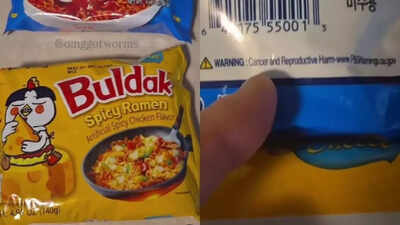Instant ramen, a staple for students and busy individuals seeking a quick and affordable meal, is now under scrutiny after a viral video revealed a concerning label. The video has ignited a heated debate about the safety and ingredients of this popular convenience food.

A recent video circulating on social media displays a ramen packet bearing the warning: "Cancer and Reproductive Harm." This revelation has sent shockwaves across the internet, prompting many to question the potential health risks associated with consuming instant noodles.
Ramen noodles have long been the go-to choice for a fast and easy meal. However, an Instagram video has stirred up controversy by highlighting a disturbing warning label on a ramen packet. The user who posted the video expressed their shock and urged viewers to exercise caution regarding their food choices, especially with common items like instant noodles.
The warning label is believed to be related to California’s Proposition 65, a law requiring products containing chemicals known to cause cancer or reproductive harm to carry a warning. The discovery has triggered concern among ramen enthusiasts, who may have never considered the potential hazards linked to their beloved snack.
The viral video quickly garnered significant attention, triggering a flood of responses from concerned social media users. One commenter suggested that the packaging itself could be toxic, potentially leaching harmful chemicals into the food.
Another user cautioned against excessive consumption of spicy foods, linking it to an increased cancer risk.
While some expressed alarm, others attempted to offer a balanced viewpoint. One commenter noted that moderation is key, suggesting that occasional consumption of instant ramen should not pose a significant threat.
The United States Department of Agriculture (USDA) provides detailed information on the nutritional content of ramen noodles. An 81-gram serving of instant noodles contains:
Furthermore, instant noodles are typically high in monosodium glutamate (MSG), a flavor enhancer known to cause adverse reactions in some people. Potential symptoms of high MSG consumption, as reported by Healthline, may include:
While not everyone experiences these symptoms, MSG remains a controversial ingredient that continues to fuel debates within the health and nutrition community.
Newer articles
Older articles
 Vitamin D Could Slash Tooth Decay Risk by 50%, Study Suggests
Vitamin D Could Slash Tooth Decay Risk by 50%, Study Suggests
 Indian Cricket Star Mukesh Kumar and Wife Divya Singh Announce Birth of Son
Indian Cricket Star Mukesh Kumar and Wife Divya Singh Announce Birth of Son
 Shubman Gill's Captaincy Under Fire: Bold Calls Needed After England Test Defeat
Shubman Gill's Captaincy Under Fire: Bold Calls Needed After England Test Defeat
 Microsoft Aims for Foldable Redemption with Novel Hinge Design to Rival iPhone and Android
Microsoft Aims for Foldable Redemption with Novel Hinge Design to Rival iPhone and Android
 Popular Finance YouTuber's Account Hacked, Bitcoin Scam Promoted: Security Lessons Learned
Popular Finance YouTuber's Account Hacked, Bitcoin Scam Promoted: Security Lessons Learned
 Esha Gupta Breaks Silence on Hardik Pandya Romance Rumors: 'We Were Just Talking'
Esha Gupta Breaks Silence on Hardik Pandya Romance Rumors: 'We Were Just Talking'
 Hollywood's Love Affair with India: Iconic Film Locations Revealed
Hollywood's Love Affair with India: Iconic Film Locations Revealed
 Rishabh Pant Aims to Surpass Virat Kohli in Test Century Tally During England Series
Rishabh Pant Aims to Surpass Virat Kohli in Test Century Tally During England Series
 Prithvi Shaw Credits Sachin Tendulkar's Guidance for Career Revival After Setbacks
Prithvi Shaw Credits Sachin Tendulkar's Guidance for Career Revival After Setbacks
 Ashada Gupt Navratri 2025: Unveiling Dates, Timings, Significance & Secret Rituals
Ashada Gupt Navratri 2025: Unveiling Dates, Timings, Significance & Secret Rituals